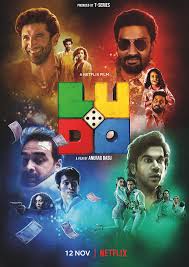Some films take you on a wild ride, and this one is no exception. With a vibrant ensemble cast including Abhishek Bachchan, Pankaj Tripathi, Rajkummar Rao, Aditya Roy Kapur, Fatima Sana Shaikh, and Sanya Malhotra, it is set in the hustle and bustle of contemporary India. Blending elements of crime, comedy, romance, and dark humor, this anthology film, directed by Anurag Basu, is a colorful roller-coaster that connects four distinct yet intertwined stories, all revolving around the chaotic unpredictability of life—much like the game of Ludo itself.
The movie kicks off with a seemingly random chain of events, involving kidnapping, crime, and unexpected love triangles. Each character’s fate is intricately tied to the other, even if they aren’t fully aware of it. From a helpless father caught up in a dangerous ransom to a hopeless romantic trying to reunite with his first love, the film keeps shifting its focus between different plotlines. Along the way, it explores themes like karma, destiny, morality, and chance. The overarching question remains: How much control do we truly have over our lives, or are we all just pieces on the Ludo board, moved by the hands of fate?
One of the most remarkable aspects of this film is its cast. Rajkummar, in particular, steals the show as a lovesick and eccentric character who can do anything for his childhood sweetheart. His comedic timing, mixed with an underlying sadness, makes his performance one of the most memorable. Pankaj, who plays a ruthless yet oddly likable gangster, adds a sense of menace but does so with a touch of dark humor. His role anchors much of the film’s narrative, providing the necessary tension in an otherwise lighthearted tone. Abhishek, portraying a brooding character whose life has taken a turn for the worse, brings depth to a man weighed down by his circumstances but with a soft spot for a child who changes his outlook. Aditya and Sanya bring in the youthful energy, playing two lovers caught in a quirky situation, and their chemistry is palpable. Each actor delivers nuanced performances, creating characters that feel real, despite the film’s surreal, whimsical tone.
Visually, the film is a feast for the eyes. The cinematography, with its kaleidoscopic color palette, matches the unpredictability and complexity of the game that the film mirrors. The clever use of light and shadows, especially during tense moments or high-energy sequences, adds depth to each scene. The opening sequence, featuring a Ludo board that eventually transitions into real-life scenarios, sets the tone for the film’s visual creativity. The locations, from the narrow alleys of small towns to neon-lit cityscapes, capture the varied and chaotic essence of modern India.
The film’s direction is another strong point. Anurag, known for his unique style of storytelling, weaves multiple plotlines together seamlessly, and despite the constant shifts in tone and pace, the movie never feels disjointed. His use of metaphors—like the Ludo board, dice, and the game pieces—enhances the narrative, drawing deeper meaning from the chaos. His ability to balance comedy with dark undertones, while keeping the audience emotionally invested, is commendable. There are moments when the film transitions from slapstick humor to introspective commentary on life’s unpredictability, yet these shifts feel natural and earned.
Musically, the soundtrack is a delight. The background score by Pritam elevates the mood of the film, complementing the characters’ journeys. Whether it’s a romantic ballad or a more upbeat, quirky number, the music flows effortlessly with the scenes, further adding to the emotional resonance. The musical effects are well-placed, particularly during moments of heightened tension or realization, and they help drive the momentum forward.
Editing is key in a multi-layered narrative like this, and it shines through. Despite having several plotlines to manage, the film never feels overwhelming. The transitions between stories are smooth, and the editor makes sure that the pacing remains engaging throughout. The choice to give each storyline its unique color scheme and visual style also helps differentiate the narratives, making it easier for the audience to follow along without getting confused.
While the film does many things right, its non-linear storytelling might not appeal to everyone. Some may find the constant back-and-forth between characters and timelines a little hard to follow, especially in the first half. The movie also runs slightly longer than necessary, with certain subplots feeling stretched out. However, these are minor hiccups in an otherwise brilliantly crafted film.
In conclusion, this is a beautifully chaotic film that explores the complexities of life, love, and chance. With an ensemble cast delivering stellar performances, gorgeous cinematography, and a director with a clear vision, it’s a film that manages to entertain while making you ponder the unpredictability of fate. If you’re a fan of dark comedies that weave multiple storylines together with a dash of whimsy, this one should be high on your watchlist. It’s a colorful, engaging ride that keeps you guessing till the very end.







